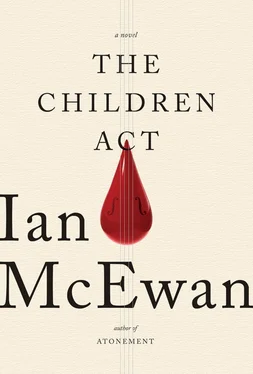She thought of his proposed or actual lover, his statistician, Melanie—she had met her once—a silent young woman with heavy amber beads and a taste for the kind of stilettos that could wreck an old oak floor. Other women cloy/The appetites they feed, but she makes hungry/Where most she satisfies . It could be just like that, a poisonous obsession, an addiction drawing him away from home, bending him out of shape, consuming all they had of past and future, as well as present. Or Melanie belonged, as Fiona herself clearly did, with “other women,” the ones who cloy, and he would be back within the fortnight, appetite sated, making plans for the family holiday.
Either way, unbearable.
Unbearable and fascinating. And irrelevant. She forced herself back to her pages, to her summary of the evidence from both parties—efficient and drily sympathetic enough. Next, her account of the court-appointed social worker’s report. A plump, well-intentioned young woman often out of breath, uncombed hair, untucked unbuttoned blouse. Chaotic, twice late for the proceedings, due to some complicated trouble with car keys and documents locked in her car and a child to collect from school. But in place of the usual please-both-parties dither, the Cafcass woman’s account was sensible, even incisive, and Fiona quoted her with approval. Next?
She looked up and saw her husband on the other side of the room, pouring another drink, a big one, three fingers, perhaps four. And barefoot now, as he, the bohemian academic, often was indoors in summer. Hence the quiet entrance. Likely he had been lying on the bed, regarding for half an hour the lacy ceiling moldings, reflecting on her unreasonableness. The hunched tension of the shoulders, the way he returned the stopper—a smack with the heel of his thumb—suggested that he had padded in for an argument. She knew the signs.
He turned and came toward her with his undiluted drink. The Jewish girls, Rachel and Nora, must hover behind her like Christian angels and wait. Their secular god had troubles of her own. From her low perspective, she had a decent view of his toenails—nicely trimmed and squared off, bright and youthful half-moons, no sign of the fungal streaks that stained her own toes. He kept in shape with faculty tennis and a set of weights in his study, which he aimed to raise a hundred times in the course of every day. She did little more than haul her bag of documents through the Courts of Justice to her room, taking the stairs rather than the lift. He was handsome in an unruly way, lopsidedly square-jawed, a toothy game-for-anything expression that charmed his students, who didn’t expect a dissolute look in a professor of ancient history. She had never thought he laid a finger on the kids. Now, everything looked different. Perhaps, for all a lifetime’s entanglement in human weakness, she remained an innocent, mindlessly exempting herself and Jack from the general condition. His only book for the non-academic reader, a pacy life of Julius Caesar, made him briefly almost famous in a muted, respectable fashion. Some pert little second-year minx might have irresistibly put herself in his way. There was, or there used to be, a couch in his office. And a NE PAS DÉRANGER sign taken from the Hôtel de Crillon at the end of their long-ago honeymoon. These were new thoughts, this was how the worm of suspicion infested the past.
He sat down in the nearest chair. “You couldn’t answer my question so I’ll tell you. It’s been seven weeks and a day. Are you honestly content with that?”
She said quietly, “Are you already having this affair?”
He knew that a difficult question was best answered by another. “You think we’re too old? Is that it?”
She said, “Because if you are I’d like you to pack a bag now and leave.”
A self-harming move, without premeditation, her rook for his knight, utter folly, and no way back. If he stayed, humiliation; if he left, the abyss.
He was settling into his chair, a studded, wood and leather piece with a look of medieval torture about it. She had never liked Victorian Gothic, and never less than now. He crossed his ankle over his knee, his head was cocked as he looked at her in tolerance or pity, and she looked away. Seven weeks and a day also had a medieval ring, like a sentence handed down from an old Court of Assize. It troubled her to think that she might have a case to answer. They’d had a decent sex life for many years, regular and lustily uncomplicated, on weekdays in the early morning just as they woke, before the dazzling concerns of the working day penetrated the heavy bedroom curtains. At weekends in the afternoons, sometimes after tennis, social doubles in Mecklenburgh Square. Obliterating all blame for one’s partner’s fluffed shots. In fact, a deeply pleasurable love life, and functional, in that it delivered them smoothly into the rest of their existence, and beyond discussion, which was one of its joys. Not even a vocabulary for it—one reason why it pained her to hear him mention it now and why she barely noted the slow decline of ardor and frequency.
But she had always loved him, was always affectionate, loyal, attentive, only last year had nursed him tenderly when he broke his leg and wrist in Méribel during a ridiculous downhill ski race against old school friends. She pleasured him, sat astride him, now she remembered, while he lay grinning amid the chalky splendor of his plaster of Paris. She did not know how to refer to such things in her own defense, and besides, these were not the grounds on which she was being attacked. It was not devotion she lacked but passion.
Then there was age. Not the full withering, not just yet, but its early promise was shining through, just as one might catch in a certain light a glimpse of the adult in a ten-year-old’s face. If Jack, sprawled across from her, seemed absurd in this conversation, then how much more so must she appear to him. His white chest hair, of which he remained proud, curled out over his shirt’s top button only to declare that it was no longer black; the head hair, thinning monkishly in the familiar pattern, he had grown long in unconvincing compensation; shanks less muscular, not quite filling out his jeans, the eyes holding a gentle hint of future vacancy, with a matching hollowness about the cheeks. So what then of her ankles thickening in coquettish reply, her backside swelling like summer cumulus, her waist waxing stout as her gums receded? All this still in paranoid millimeters. Far worse, the special insult the years reserved for certain women, as the corners of her mouth began their downward turn in pursuit of a look of constant reproach. Fair enough in a bewigged judge frowning at counsel from her throne. But in a lover?
And here they were, like teenagers, shaping up to discuss themselves in the cause of Eros.
Tactically astute, he ignored her ultimatum. Instead he said, “I don’t think we should give up, do you?”
“You’re the one who’s walking away.”
“I think you have a part in this too.”
“I’m not the one about to wreck our marriage.”
“So you say.”
He said it reasonably, projecting the three words deep into the cave of her self-doubt, shaping them to her inclination to believe that in any conflict as embarrassing as this, she was likely to be wrong.
He took a careful sip of his drink. He was not going to get drunk in order to assert his needs. He would be grave and rational when she would have preferred him loudly in the wrong.
Holding her gaze he said, “You know I love you.”
“But you’d like someone younger.”
“I’d like a sex life.”
Her cue to make warm promises, draw him back to her, apologize for being busy or tired or unavailable. But she looked away and said nothing. She was not going to dedicate herself under pressure to revive a sensual life she had at that moment no taste for. Especially when she suspected the affair had already begun. He had not troubled himself to deny it, and she was not going to ask again. It was not only pride. She still dreaded his reply.
Читать дальше












